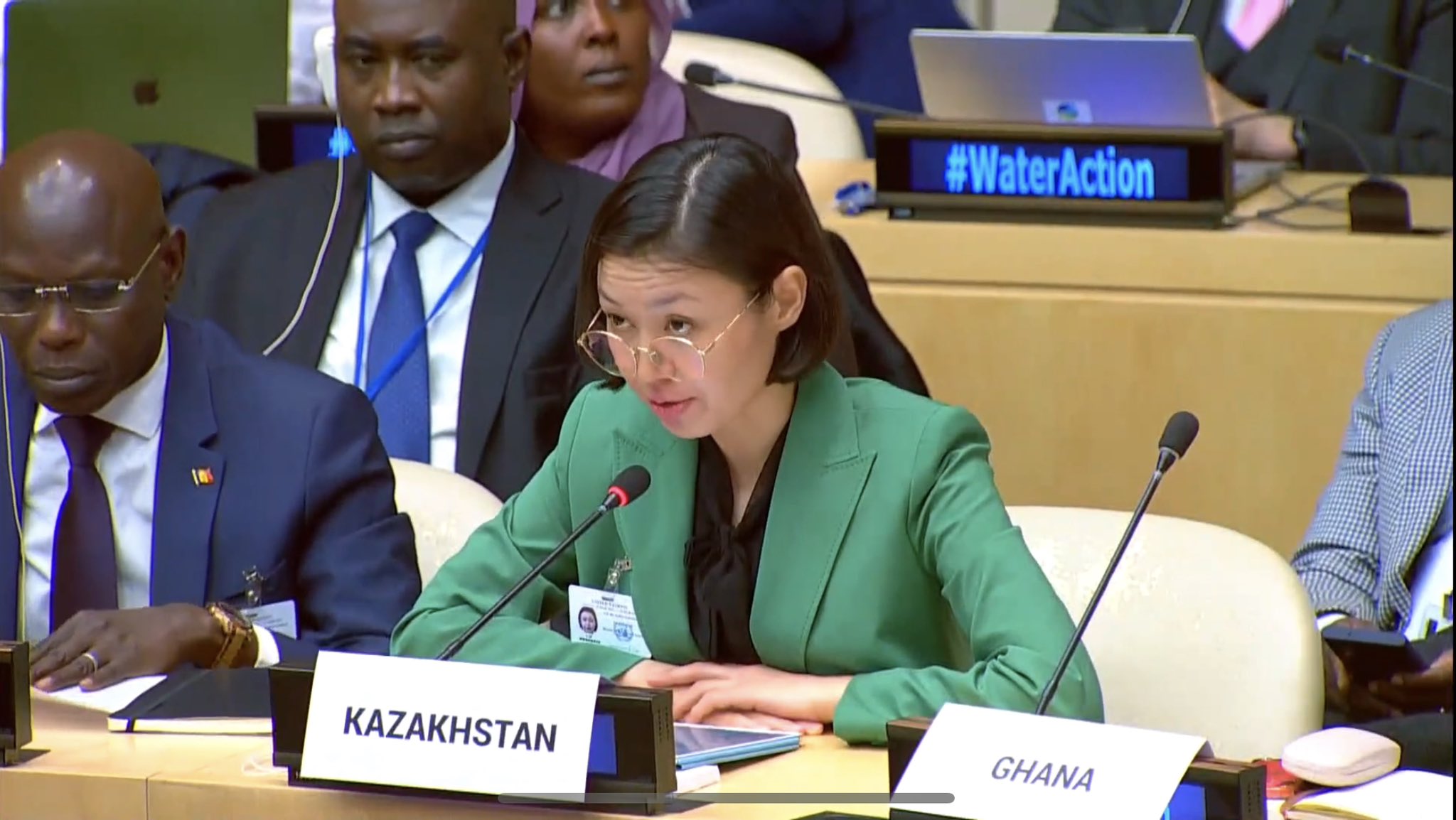Editor’s Note: As the global community converges for COP28 in Dubai this week, we are honored to present an insightful article featured in The National Interest that sheds light on Central Asia’s pivotal role in climate action. With temperatures doubling the global average, the region faces profound challenges, from shifting precipitation patterns to threats to water and agriculture, underscoring the urgent need for global attention and collaborative solutions.

Zulfiya Suleimenova at the UN 2023 Water Conference. Photo credit: Permanent Mission of Kazakhstan to the United Nations.
ASTANA – Аs the world turns its attention to the upcoming COP28 in Dubai, a pivotal narrative unfolds in Central Asia, particularly in Kazakhstan, where the fight against climate change is not only a policy agenda but also a lived reality.
Central Asia, often overlooked in global discussions, is now emerging as a key player in the climate arena. In this region, temperature increases are double the global average. This stark reality means more than just hotter summers; it spells drastic changes in the structure of precipitation, affecting water availability and agricultural viability, and poses the risk of displacing millions of people.
In response, Kazakhstan is determined to take action and contribute to global climate efforts. Our pledge to achieve carbon neutrality by 2060 is a roadmap to a sustainable future. With our updated Nationally Determined Contributions under the Paris Agreement, we have committed to reducing carbon emissions by 15 percent unconditionally by 2030. Additionally, we have set a conditional target of a 25 percent reduction, contingent on climate investments and technology transfer. These commitments are integral to our transformative journey towards a greener Kazakhstan.
Kazakhstan’s environmental initiatives have implications that reach well beyond our borders. The success of global climate action hinges on each country’s contribution. Historically, Kazakhstan’s economy has heavily relied on fossil fuels, including oil, gas, and coal. Yet, our strategies and actions aimed at promoting a low-carbon, green transition provide valuable insights into how to balance sustainable practices with economic growth. These strategies are particularly vital for a nation traditionally dependent on extractive industries, offering a blueprint for other nations. By investing in renewable energy, decarbonization strategies, and sustainable practices, we want to demonstrate that the transition to a green economy is both feasible and beneficial, even for nations whose economies are deeply rooted in oil and gas.
Kazakhstan’s national Emissions Trading System (ETS) is a critical element in reducing carbon emissions. Established in 2013, this system currently encompasses 43 percent of the nation’s greenhouse gas emissions and is slated for further development. Efforts are ongoing to improve measurement, reporting, verification, and benchmark methodologies. Additionally, we are exploring the expansion of this system to include new sectors, installations, and gases currently outside the ETS’s scope. In line with the Carbon Border Adjustment Mechanism, work has begun to align our national ETS with the EU ETS.
Equally critical is the transition in the energy sector. Coal significantly contributes to emissions in the national energy sector. Echoing Kazakh President Tokayev, a gradual, sustainable, and socially responsible shift away from coal usage could substantially aid in achieving global climate goals. Our strategy includes phasing out older coal-fired plants over the medium to long term, coupled with the introduction of carbon capture and utilization technologies to reduce emissions from remaining sources. Our renewable energy capacity has already grown to 4.8 percent, and we aim to at least triple this figure by 2030, alongside advancing hydrogen development.
While national actions are crucial, international cooperation and accelerating regional initiatives are even more vital. In 2026, we plan to host the Regional Climate Summit under the auspices of the UN and other international organizations. The event is set to become a landmark event to mobilize regional action and unify the region’s voices toward a common vision for climate action and resilience.
This summit, along with our ongoing regional collaboration efforts, underscores our commitment to collective action. Our recent collaboration with the United States Agency for International Development under the C5+1 diplomatic platform exemplifies this commitment. Through this collaboration, we are working to advance sustainable energy practices across Central Asia.
The role of Kazakhstan and Central Asia in global climate discourse is immensely significant. As we approach COP28, it is crucial for the international community to recognize and engage with the unique challenges and solutions emerging from Central Asia. The actions and commitments of this region are integral pieces of the global puzzle in addressing climate change.
Kazakhstan and Central Asia are not merely observers of climate change but proactive participants in environmental stewardship. As the world grapples with the complexities of climate change, our region’s efforts provide valuable lessons and opportunities for global cooperation. Together, we can forge a path towards a more sustainable and resilient future.
The author is an Advisor to the President – Special Representative of the President of Kazakhstan for International Environmental Cooperation.
The article was originally published in The National Interest.
